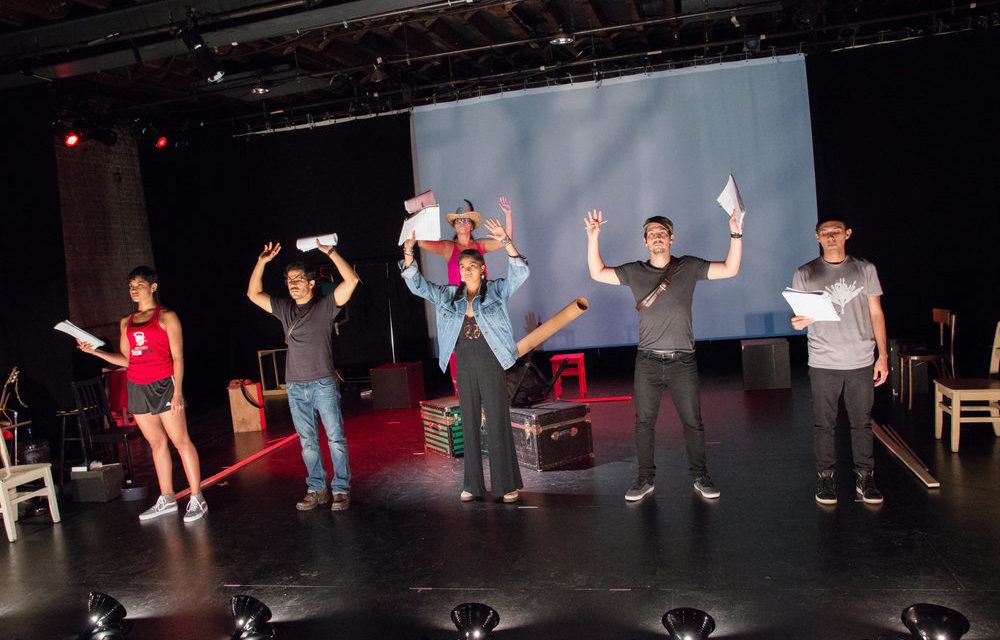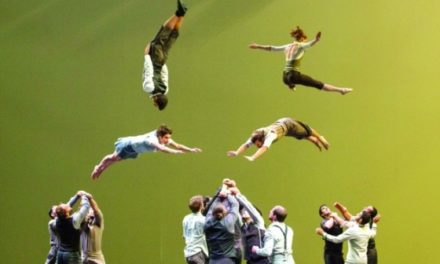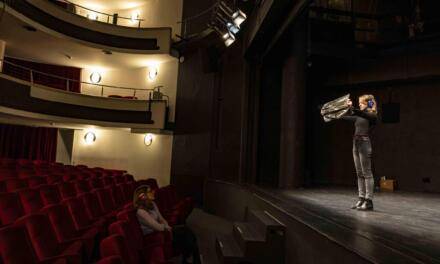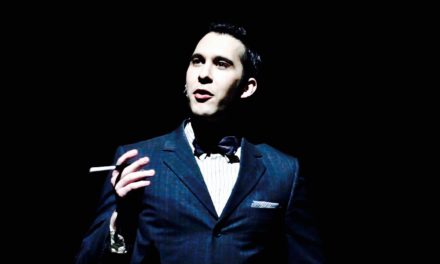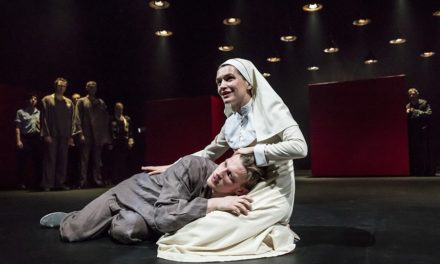This February, playwright Beto O’Byrne’s The Corrido Of The San Patricios will receive a staged reading at Stages Repertory Theatre’s Sin Muros Latinx Theatre Festival in Houston, Texas. As a native of East Texas, O’Byrne has deep roots in the Lone Star State. In Houston, he will continue developing his play with director Kinan Valdez, dramaturg Meropi Peponides, and musicians Chas Croslin, and Noé Yaocoatl Montoya.
Now based in New York City, O’Byrne’s plays include Among The Sand And Smog, The Golden Drum Year, and Loving And Loving. His commissions include works for 52nd St. Project, The Foundry Theatre, The Movement Theatre Company, and Watts Village Theater Company. O’Byrne has been a resident artist at numerous organizations, including New York Theatre Workshop (2050 Fellowship), Pregones/PRTT, the Stella Adler School of Acting (playwright-in-residence), the Texas Black and Latino Playwriting Festival, INTAR’s Maria Irene Fornes Hispanic Playwrights in Residence Laboratory, Lincoln Center Theater’s Director’s Lab, and Tofte Lake Arts Center Emerging Artists Residency. In addition, he is a co-founder of Radical Evolution, a multi-ethnic, multi-disciplinary producing collective based in Brooklyn, NY.
In this interview, O’Byrne discusses The Corrido Of The San Patricios, working with Kinan Valdez, and Meropi Peponides, and the show’s development at the upcoming Sin Muros Latinx Theatre Festival.
Trevor Boffone: Much of your work deals with cultural multiplicity and hybrid identities. Can you tell us more about how these concepts inform your work?
Beto O’Byrne: This is both a simple and complex question.
Simple, in that, like most if not all writers, my work is greatly informed by my personal experience. I was born into a multi-ethnic household in a multicultural region of the country, so there were different cultures at play in my life and my worldview is greatly informed by that experience.
It’s more complex because the longer I am writing, and living, I am coming to understand that there is a deep truth that we all have these experiences in some way or another. While we might not all be multi-ethnic (or at least not consciously presenting or celebrating it), we all have multiple identities at play. And it’s not just our genetic or familial cultures, but our societies, our social circles, all the complex ways we come to be who we are. I’m not just a Tejano/Irish American. I’m also a Cajun-Californian-heteronormative-cis-male-AnarchoPunk-Antiracist-Country-Writer-Theatre Maker-Musician-Brooklynite and probably a few more I am forgetting right now.
In a form like theatre, where it’s easy for makers to default to iconography and monolithic representations, it’s easy to forget about this complexity. For me, it’s hard to resist. And it’s also hard for me to not expect it in others’ work. Or at least that is the kind of story that is interesting to me, though it can be a difficult find. Maybe that’s why I write? #discoveries
Trevor: The Corrido Of The San Patricios sheds light on the role that Irish immigrants played in the Mexican American War, which is largely left out of history books. Where did the idea for this play emerge?
Beto: Well, this story is a legend known by many in the Mexican-American community. I don’t remember how exactly I first learned about it back in graduate school, but pretty quickly after I did, I knew it was important to me, and having the cultural backgrounds that I do, it was something of a no-brainer to me that I needed to tell it.
How it came about in this iteration is more interesting to me than the inspiration. I was originally commissioned by Watts Village Theatre Company in Los Angeles, specifically the artistic director at the time, Guillermo Avilés-Rodriguez. I had the awesome privilege of getting to work with him and two maestros of Chicano Theatre, Jorge Huerta and Carlos Morton, on the first explorations of this story. And while the experience was transformative, and my collaborators excellent, I became too bogged down in historical contradictions. For example, the many different reasons why the San Patricios choose to defect overrode the connection I was trying to make with the audience. So ultimately, the first attempt was not successful, and I decided to shelve the script for a while.
Then in 2013, I had the great pleasure of meeting Kinan and Chas at a theatre conference, and I soon approached them about working with El Teatro Campesino on it. As someone who came up through the Teatro in Texas (shout-out to Teatro Vivo in Austin!), it was an absolute dream come true of mine to work with El Teatro Campesino. I am getting to work with the artists who created the forms and aesthetics that inspired my work. It’s incredible.
I remember several conversations with Luis Valdez telling me, “We need this story, man!” and “The Irish are the Mexicans of Europe, you know.” So Meropi and I started exploring it more as the myth and legend that grew out of the history, and we began doing so not just as me the writer, but as an ensemble of artists inspired to tell this tale. When this happened, the story we were trying to tell really became clear.
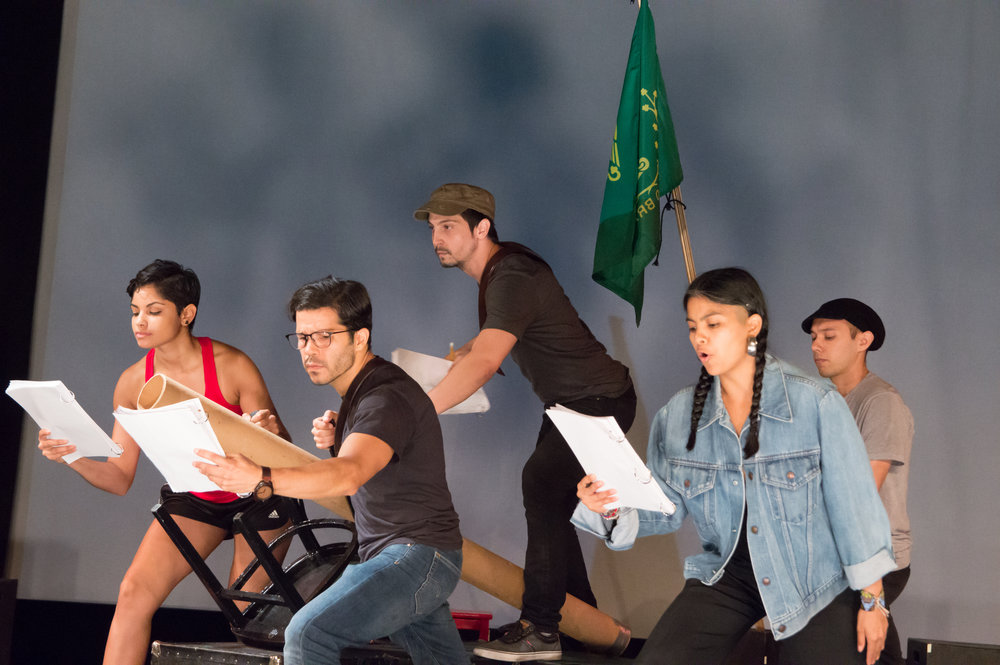
The cast of The Corrido Of The San Patricios at Pregones. Photo courtesy of Radical Evolution.
Trevor: What has been your experience developing this play with Kinan Valdez and Meropi Peponides?
Beto: One of the biggest privileges in my life is that I get to create work with incredible artists that I also get to call friends. The act of creation is also so intimate for me; I consider both of the above familia. It’s really, really hard for me to encapsulate what it is like to work with each of these amazing people into words, and seeing that I’m a writer for a living, I hope that says something about the depth of the experience. But for the sake of the interview, let me at least attempt.
Since I first met Kinan I knew I wanted him to direct something of mine. Beyond being the maestro that he is, there was just something about the way we talked and jived with one another that just made it clear to me that we had such similar politics and temperaments, that I knew it would be a great experience. I find he has a near endless bag of theatrical tricks he can pull from, and every second I get to work with him, I am becoming a better artist. Who could ask for more in a collaborator?
I also want to do a quick shout out to two other long-standing members of El Teatro Campesino who have been working with us on the Corrido. Chas Croslin is a dear, dear friend who has been with us from the beginning and is one of the most passionate artists I know. Getting to learn more about his music and his life through this project has been a great joy and he is one of my favorite collaborators. Noe Yacoatl Montoya, our maestro, has been critical to making it happen and it’s a blessing to me that he keeps saying yes to working on it. These two musicos have shaped the world of this play and continue to be instrumental to its success. We are a great team!
One of the most influential books on me about the craft of writing and the life of a writer was Stephen King’s On Writing. In it, he talks about the Ideal Reader, that person that he is writing to and for. For me that is Meropi. I know that if I have written something she is responding to positively I am on the right track. We created Radical Evolution together. We work together on most projects. She reads just about every first draft of everything I write, sometimes, I think, whether she wants to or not. She rarely, if ever, gives me a note I don’t take. When I am at my most honest, I admit that I would not be the artist I am today if I had not met her. She also happens to be my life partner. It is a very complex relationship and the most joyous one of my life.
Trevor: What are you hoping to learn about the project during Sin Muros?
Beto: We are now at the phase of developing the show that we are thinking about what the world premiere of the show will be. We have been in process for about two years, and are now in the final stages of development. There are still things in the script, things in the staging, we are still creating, but con esperanza y un poco de suerte, we are going to step of this workshop ready to find this piece a home.
Trevor: What do you want audiences to take away from this play?
Beto: I don’t like thinking of audiences as monoliths and as such, I often struggle with this kind of question. I can better respond by telling you why I am passionate about telling this story. I think borders do not protect us, they wall us in. I think White Supremacy can be defeated by people reclaiming their histories and seeing how structural racism once excluded many from Whiteness that it now includes–a testament to its problematic construct. I think cultures, like our personal identities, are fluid, not rigid, and inform each other, and we should celebrate that as well. I believe that when we see this history, we can understand that the people and the forces that are working so damn hard these days to keep us separated from one another are a part of the long arc of history that has been doing so since this country began, and probably well before that. And just like the Patricios, I believe we have to stand up for what we think is right.
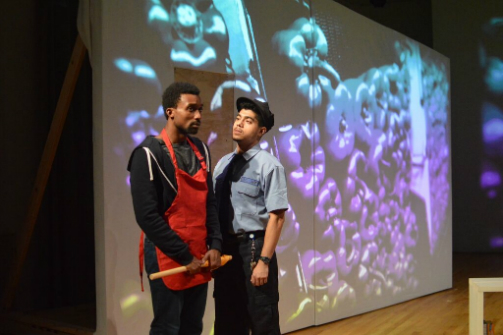
Allan K. Washington and Fernando Gonzalez in The Golden Drum Year. Photo by Radical Evolution.
Trevor: One of the primary goals of Sin Muros is to create a space for Texas Latinx theatre artists to engage in art-making while growing the Latinx theatre community in Houston. How does Texas inform your work, if at all?
Beto: In all truth, I have to ask, “How has Texas not informed my work?” Texas is my blood, it is the ground that fed me and air that first entered my lungs. I am a Tejano on my mother’s side with a family history that extends in Texas as far back as Juan Seguin and the Texas Revolution. On my father’s side, we emigrated from Ireland in the late 1800s and came to East Texas, setting up a lumber mill outside of Longview and the O’Byrne clan became instrumental in that area. This history, even though I live in Brooklyn, it’s in me every day, to the point that I think it makes Meropi’s eyes roll. Pero soy puro Tejano, what can I do? It is going to sound foolish to many, but when I first left Texas, originally to California, I felt like I was immigrating to another country. And like so many immigrants, I wear my heritage cultures like a life preserver, because that’s what they are.
Texas is my home. It’s a place that I love so much that I can’t stand the hate that I am seeing come out of it. There are days I feel guilty not being here to fight it with every square inch of my skin. I urge every Texan to learn our complex history. Not just the things that inform what we see as our positive traits, but if we are going make a better world in which to live, we have to clean the wounds. We have to talk passionately about our Texas Pride, our music, our food, and in the same conversation own our culpability to slavery, genocide, and institutionalized disparity. There is a reason why the story of the Alamo is taught in schools and the Mexican American War isn’t. There is also a reason why when people from other countries think of the US, Texas is a major part of what they are thinking about. And as warped and inaccurate that vantage point may be, there is still a reason for it. And there is no reason the Texas in our dreams can’t be the Texas that exists in the world. All we have to do is open ourselves up to the beauty of humanity.
Trevor: Can you tell us more about Radical Evolution?
Beto: With Pleasure! Meropi and I created Radical Evolution back in 2011 to be a home for our work, largely because we struggled to find work that we felt was speaking to our world view, one that is multiethnic, complex, and supports artists of color seeking to create work that is exploring form and process. We place a high priority on how we create the work, not just what we create, and work to be hyper-conscious of the rooms we create, how we support our collaborators and the long-term vision of our projects. This usually results in long-term collaborations (such as the one here with El Teatro Campesino), and show-specific ensembles. It’s a real blast making work through Radical Evolution!
So far, we have had two full productions: Golden Drum Year (2015) and Loving And Loving (2017) and created work with some amazing artists and organizations, too many to list here. The 2018-19 season is shaping up to be one of our most exciting. The Corrido Of The San Patricios, is on track to have its world premiere soon, and we are talking with theatres across the country about where this may take place. We are developing our next production Songs About Trains, a theatrical concert that makes visible the impact of immigrant labor and the labor of communities of color in shaping this country through the building of the US rail system. The deepest canon of folk music in this country is train songs. We are privileged to be in residence at the New Ohio Theatre in New York City and will premiere the work in Spring, 2020. We also went to India back in November, with the goal of expanding our work outside the US and discover more about other cultures/collaborations to inform all our work. We made some amazing connections with artists in New Delhi and Mumbai, and are excited about the future potential of those relationships. It’s been a whirlwind so far, but a fun one to get swept up in!
Feel free to check out more about what we have going on at www.radicalevoultion.org.
This post was written by the author in their personal capacity.The opinions expressed in this article are the author’s own and do not reflect the view of The Theatre Times, their staff or collaborators.
This post was written by Trevor Boffone.
The views expressed here belong to the author and do not necessarily reflect our views and opinions.

